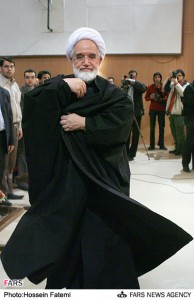
1315 GMT: We'll be on extended break today, as I'll be lost in the wilds of Georgia in the US. While I make my way back, EA readers --- as they did yesterday --- will be keeping the news and chatter going.
1300 GMT: The Oil Squeeze (cont.). This time, it's exports rather than imports (see 0920 GMT) causing an issue.
Khabar Online reports, "From the early 2010 Iran’s oil export has dropped by 378,000 barrels a day compared to 2009 and it will cause a $9.5 billion deficit in the country’s oil revenues this year."
NEW Iran: A View From Tehran “The New Year Challenges”
NEW Iran: A Note About the Voice of America, NIAC, and the “Journalism” of The Washington Times
Iran’s Nukes: Can Tehran and the US Make A Deal?
The Latest from Iran (14 April): Ahmadinejad’s Struggle
Still, Iranian officials
maintain a positive line:
Iran's Oil Minister says US-led sanctions against Iran have failed as the country has managed to become self-sufficient in oil production and products.
"International sanctions are not a new issue and we have no problem in dealing with them," Masoud Mirkazemi told reporters on Wednesday after a cabinet session.
1105 GMT: We've posted
a separate analysis, "A Note About the Voice of America, NIAC, and the 'Journalism' of The Washington Times". And we also open
a window on analysis inside Iran with a piece from
Iran Review, "The New Year Challenges".
1055 GMT: Political Prisoner Watch. RAHANA claims that Mottahareh Bahrami, currently detained in Evin’s women’s ward,
has been sentenced to death, pending appeal, for alleged links to the Mujahedin-e-Khalq "terrorist" organisation. Bahrami was arrested on Ashura (27 December 27), along with her husband, her son and 2 friends.
1050 GMT: The Subsidy Battle. More back-and-forth over the Ahmadinejad fight with Parliament on subsidy reductions and spending. Mohammad Reza Khabbaz of the Majlis' Economics Committee
has reiterated that the Government must implement the Parliament-approved subsidy plan; however, Ahmadinejad backer Ali Asghar Zarei has insisted that
implementation is up to the President.
On another front, Fereydoun Hemmati of the Supreme Audit Committee has insisted that the
budget report for last year cannot be altered. The report has a number of provocative claims, including the "loss" of oil revenues by the state.
1035 GMT: The Corruption Allegations. As the charges of corruption by prominent MP Elyas Naderan against First Vice President Mohammad Reza Rahimi resonate, the "hard-line" newspaper
Kayhan has called for an end to fighting amongst "fundamentalists".
1025 GMT: Rumour of Day.
Khabar Online suggests that former President Mohammad Khatami will be
attending a global disarmament conference in Japan next week. The Japan event comes after this week's nuclear summit, led by President Obama, in Washington and Iran's own gathering this weekend.
0930 GMT: Political Prisoner Watch.
Peyke Iran claims
news of an "unknown" prisoner, student and Mousavi campaigner Yasser Yousefzadeh, who has been held incommunicado for more than a month.
Baha’i photographer and musician Artin Ghazanfari, released last week on $50,000 bail,
has been re-arrested.
Human rights activists, via
A Street Journalist, offers a full summary of developments, including the report that
almost 30 detainees across Iran are now on hunger strike.
0920 GMT: The Oil Squeeze. Another intriguing report this morning, and one arguably with far more significance than the Iran Parliament's reported retreat....
A company spokesman has said that Malaysia's Petronas is
halting oil shipments to Iran. Petronas, one of the largest suppliers to Tehran, has not made any deliveries since mid-March.
0910 GMT: Political Prisoner Watch. Meanwhile, back to immediate everyday concerns....
Kalemeh claims that
the renewed detention of Abdollah Momeni, the leading student activist, was caused by his refusal to cooperate with security and intelligence agents while on temporary release. Other activist and Momeni’s wife, assert that Momeni was pressed to denounce Mir Hossein Mousavi, Mehdi Karroubi, and his organisation, Advar-e Takhim Vadat. Momeni was also asked to participate in a series of staged student gatherings.
Momeni's return to prison followed a meeting last week of Mousavi and Advar-e Takhim Vahdat.
0900 GMT: We return from an extended break to find the headline-grabbing story,
as framed in The New York Times, "Iran’s Parliament Limits Its Power as a Watchdog".
Nazila Fathi's story, drawn from state media but with no details, claims, "Parliament’s decision...limited lawmakers’ ability to review regulations adopted by the Guardian Council, the Assembly of Experts, the Supreme National Security Council and the Expediency Council." Fathi evaluates, "The decision seemed to be an acknowledgment of the reality that the elected Parliament was often blocked from fulfilling its role as a watchdog over the institutions of state."
It is, to the say the least, a most curious report. Parliament has been embroiled in a heated dispute with President Ahmadinejad over his economic proposals, and the corruption allegations against First Vice President Mohammad Reza Rahimi offer a possible showdown.
We'll look for developments, but for now, is this a Parliamentary retreat or a bit of mischief by some state media "reporters"?
 Monday, April 26, 2010 at 15:13
Monday, April 26, 2010 at 15:13  From Karroubi website Saham News, translated by the Facebook page supporting Mir Hossein Mousavi:
From Karroubi website Saham News, translated by the Facebook page supporting Mir Hossein Mousavi:

